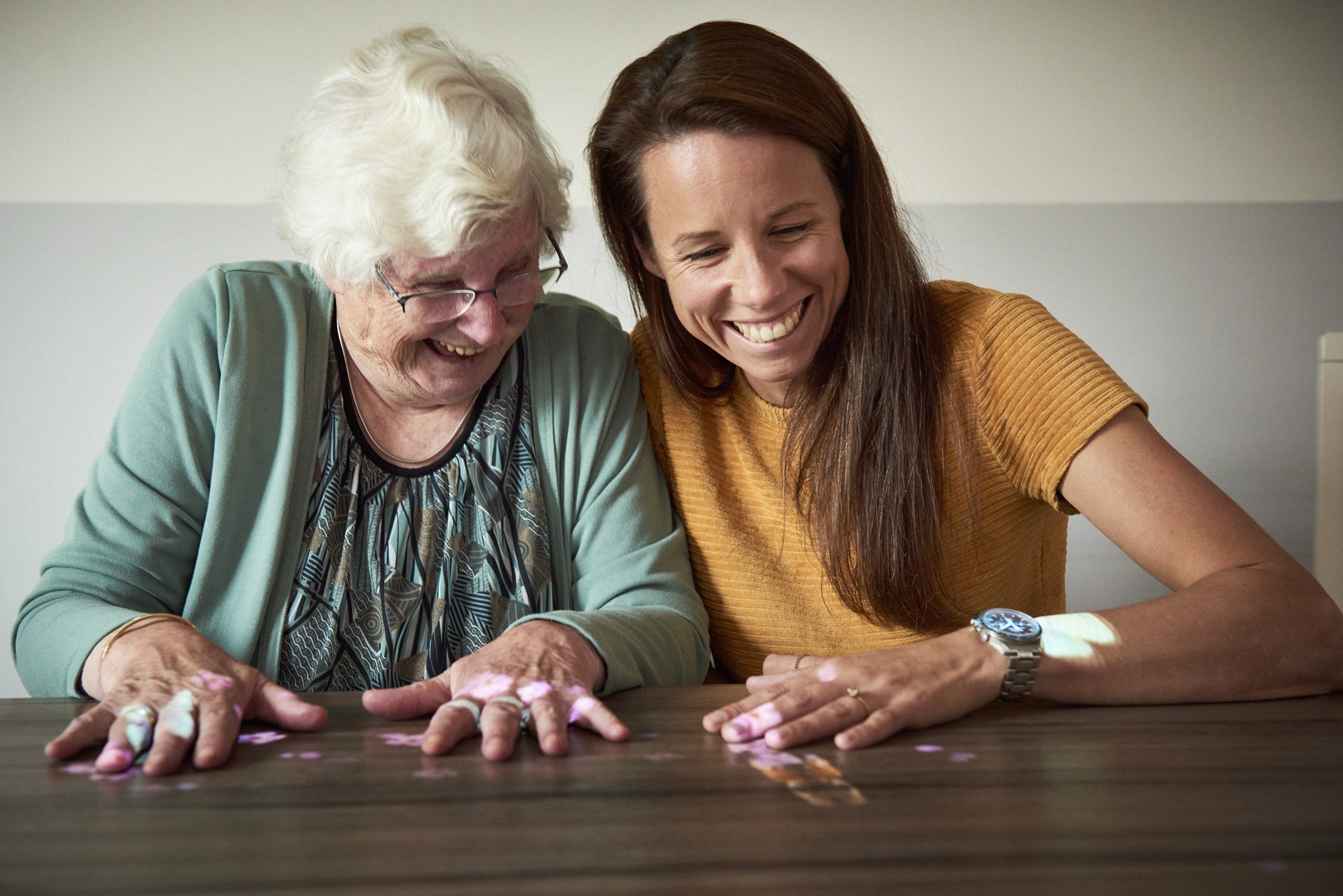Describing her as ‘a textbook example’ and a ‘versatile and innovative engineer’, TU Delft chose Hester Anderiesen-Le Riche as Alumnus of the Year 2023. This Tuesday, she comes to Delft to collect her prize. How would the inventor of the ‘Magic table’ explain her success?
Together with an elderly woman, Hester Anderiesen-Le Riche is playing a game on the Tovertafel. (Photo: Tover)
Congratulations! What was it about your work that appealed to the jury?
“I think I have shown that with a technical education, you can really make a direct social impact. We also notice that this appeals to a lot of people when we have a vacancy at Tover. All applicants want to use their technical knowledge to do something that will benefit society.”
Did you have the same drive when you started studying Industrial Design Engineering in Delft back in 2002?
“While I was studying for my Bachelor’s degree, I spent a lot of my free time windsurfing. While I was studying for my PhD, I even took part in the Sailing World Cup. Sport has always been a constant throughout my career. I need adrenaline to be the best version of myself.
While studying for my Master’s degree, I really became a fanatical student. Everything I learned led to the next interesting opportunity. One time at a windsurfing camp when I was talking enthusiastically about my graduation research on the elderly of the future, someone said: you have to meet my professor, Erik Scherder (professor of Neuropsychology at the Vrije Universiteit – ed.). He wanted to design something to get elderly people with dementia moving. I said: I can do that!” (laughs) “An exciting answer as I had no ideas at that point.”
The Tovertafel is an innovation for the care sector that projects games onto a table or onto the floor. These games react to the movements of the user and have an impact on a physical, cognitive, social and sensory level: such as breaking through apathy, stimulating movement or strengthening the relationship between care professionals and their clients or residents.
You designed the Tovertafel specifically for elderly people with advanced dementia. Why that target group exactly?
“A lot of people with dementia spend most of the day sitting still which speeds up their decline. Dementia causes them to lose their ability to use their initiative. Their brain is only a fraction of what it was. Often, they are no longer able to do much physically. In short, a huge design challenge. Perfect for me as I love working on things that I myself doubt are going to be successful. That’s when I get fired up about a project.”
You completed your Doctoral Programme with Scherder and TU professor of Physical Ergonomics Richard Goossens. So how did the Tovertafel come about?
“One of the things that we experimented with was projecting lights onto the table that came on if residents in a home left their cup of coffee untouched for too long. The idea was to get them to drink more. Not one extra sip was taken. The idea was a failure – or so I thought. Until I saw a lady move her cup to the side. She started to play with the lights. That’s when I thought: that’s something we should pursue.
So we started trying out games based on interactive light projections. One of the first was a classic beach ball projected onto the table that comes towards you. You hit it and it goes right across the table. Even people with advanced dementia play too, that movement is still in their muscle memory. It breaks through their apathy, even makes them laugh again.
Even before the end of my PhD, I got the opportunity to launch the Tovertafel on the market. At the time, I was busy setting up a business, writing a dissertation and I had my windsurfing career. All from Cape Town where I was living. In the faculty, it was met with suspicion but thanks to all the help I got, it was a success.”
There are now more than eight thousand Tovertafels in fourteen countries. Where will your fanaticism take you over the next five years?
“I have so many ideas! But I am also keen to move forward with the business. For instance, we have just launched the Tovertafel Pixie, a mobile version of the Tovertafel. We are increasingly focusing on other target groups. For instance in the US, the Tovertafel will soon be used in schools where there are children with and without cognitive limitations in the same class.”
Every year since 2011, the TU Delft University Fund has been awarding the prize of Alumnus of the Year to a former student who has done important work in innovation and research since completing their studies in Delft. Read more on the TU Delft website.
Hester Anderiesen-Le Riche
- 1983
Born - 2002-2009
Bachelor’s and master’s degree in Industrial Design Engineering, TU Delft - 2009-2017
PhD in Clinical Neuropsychology (VU) and Industrial Design Engineering (TU Delft) - 2015
Founding of Tover (formerly Active Cues) - 2015
Launch of the Tovertafel - 2020
Launch of the Tovertafel 2 - 2023
Launch of the Tovertafel Pixie



Comments are closed.